Virginia Crow's Blog: Crowvus Book Blog, page 10
September 25, 2024
#HistFicThursdays - Apollo's Raven - Linnea Tanner - Book Blast

If you've been following this blog for a little while, you might remember me sharing a fabulous guest post about this book in 2022 (which you can read here). It's always great to welcome Linnea Tanner onto the Crowvus Book Blog, and I'm delighted to be taking part in her Coffee Pot Book Club book blast blog tour.
So, let's meet the book...
A Celtic warrior princess is torn between herforbidden love for the enemy and duty to her people.
AWARD-WINNING APOLLO’S RAVEN sweeps you into an epicCeltic tale of forbidden love, mythological adventure, and political intriguein Ancient Rome and Britannia. In 24 AD British kings hand-picked by Rome torule are fighting each other for power. King Amren’s former queen, a powerfulDruid, has cast a curse that Blood Wolf and the Raven will rise and destroyhim. The king’s daughter, Catrin, learns to her dismay that she is the Ravenand her banished half-brother is Blood Wolf. Trained as a warrior, Catrin mustfind a way to break the curse, but she is torn between her forbidden love for herfather’s enemy, Marcellus, and loyalty to her people. She must summon the magicof the Ancient Druids to alter the dark prophecy that threatens the fates ofeveryone in her kingdom.
Will Catrin overcome and eradicate the ancient curse? Willshe be able to embrace her forbidden love for Marcellus? Will she cease the warbetween Blood Wolf and King Amren and save her kingdom?
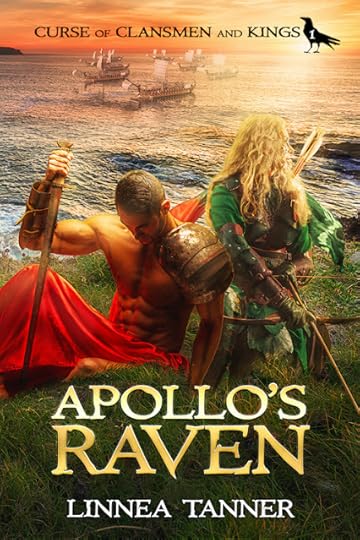
Praise for Apollo's Raven
“If youmingled the history and romance of Philippa Gregory with the magical fantasy ofGeorge R.R. Martin, the result just might be the fascinating Apollo’s Raven(Curse of Clansmen and Kings Book 1) by Linnea Tanner. Get ready for ajourney filled with the desires of star-crossed lovers, the horror of a sonpolishing his own mother’s skull and the fantasy of humans becoming creaturesas a tool to save their very humanity.”
“Sorcery?Mythology? Forbidden love? An ancient curse? Yes, please! I fully enjoyed thisepic tale of intrigue, deception, and love. The characters are developed well,while the plot leaves the reader wanting more.”
“What astory! I am a huge fan of "Game of Thrones," and this book grabbed mein much the same way. The author took me inside the world of ancient Romans andCelts. The imagery was compelling. I could see the characters, the weapons, thecountryside, the lairs, and the castle. She stayed true to the times.”
“A love storyfull of intrigue, power struggles, choosing one’s fate and a doomed love, thisstory reminds me somewhat of an old book called “The Silver Land” by NancyHarding or even “The Forest House” by Marion Zimmer Bradley. The undercurrentsare the same as they are set in similar times, but the finer details aredifferent enough that it only feels the same while still being uniquely itsown.”
Now, let's meet the author...
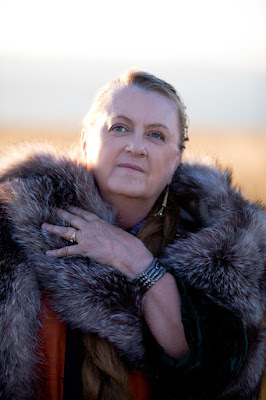 Award-winning author, LinneaTanner, weaves Celtic tales of love, magical adventure, and political intriguein Ancient Rome and Britannia. Since childhood, she has passionately read aboutancient civilizations and mythology. She is particularly interested in theenigmatic Celts, who were reputed as fierce warriors and mystical Druids.
Award-winning author, LinneaTanner, weaves Celtic tales of love, magical adventure, and political intriguein Ancient Rome and Britannia. Since childhood, she has passionately read aboutancient civilizations and mythology. She is particularly interested in theenigmatic Celts, who were reputed as fierce warriors and mystical Druids.Linnea has extensively researchedancient and medieval history, mythology, and archaeology and has traveled tosites described within each of her books in the Curse of Clansmen and Kingsseries. Books released in her series include Apollo’s Raven (Book 1), Dagger’sDestiny (Book 2), Amulet’s Rapture (Book 3), and Skull’sVengeance (Book 4). She has also released the historical fiction shortstory Two Faces of Janus.
A Colorado native, Linneaattended the University of Colorado and earned both her bachelor’s and master’sdegrees in chemistry. She lives in Fort Collins with her husband and has twochildren and six grandchildren.
You can keep up to date with Linnea here: Website - Twitter - Facebook - LinkedIn - Instagram - Threads - Pinterest - Book Bub - Amazon Author Page - Goodreads
To keep up with the rest of the tour, click the banner below!

September 19, 2024
#HistFicThursdays - Things To Inspire - Stories and Storytelling
Can you tell a story?
It's not the same as writing a book. It's not even the same as creating a great plot. Storytelling is a totally separate skill. It is the ability to take words and bring them to life, not only for yourself, but for others. Every word must count, but it should be mesmerising rather than minimalistic.
For the past few months, I've been sharing artefacts which I have collected over years, including the box file of inspirational items, and the special objects and notebook, both of which I was given as presents. Now, I'm challenging you to do the same. Here are five objects you could include in a story...
One: A bamboo and paper parasol
Two: An enamelled snuff box
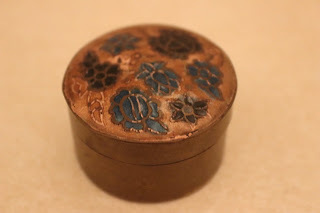
Three: An ornamental belt buckle
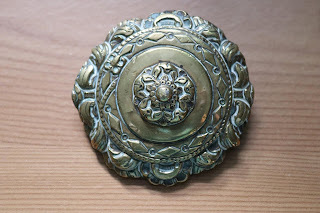
Four: Two gem-encrusted tigers

Five: A wicker birdcage
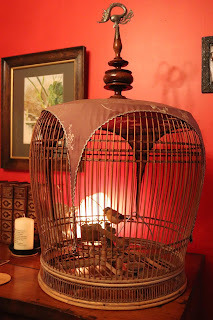
You can use one or all of these items as prompts. You don't have to write these tales down, but make sure that the story grips it's audience in the ancient art of storytelling. Even more brownie points if you can record yourself telling the story and share it.
Go ahead - bring a tale to life...
September 12, 2024
#HistFicThursdays - Free Short Story - Of All the Pleasant Sights They See
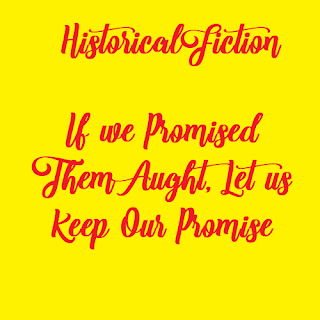 ☝ The story behind the Pied Piper 👆
☝ The story behind the Pied Piper 👆I know I've shared my take on the traditional legend of the Pied Piper (above!) before, so here's a little story about the legacy of that legend. This is one of the early adventures of Frederik, a young pilgrim on his way to Rome, and all he encounters in the town of Hameln, some years after the legendary events...
Of All The Pleasant Sights They See
(first published in Hooded:Hidden)
February was a cold month. Not only cold, but dark too. But the further he travelled, the longer the days became. Back at home, this change was slower. Frederik had tried only to travel in daylight. At first, he had believed his destination could be reached in a handful of weeks. After all, Father Willehad received news within the month it had been written. But his letters were delivered by emissaries on horseback. On foot it took much longer.
Weeks had been an optimistic aim.
And then he had become lost. Frederik had arrived in The Empire close to Advent, making excellent progress. But he had become lost in the monstrous size of Hamburg and, entirely disorientated, had left by the western gate instead of the south. After this, he had reached Bremen only two days before Christmas, and had spent the feast within the city walls.
It had been there he heard the legend.
Two months following the Weser River, he finally reached the town. It would have been far easier to have taken a boat, but his journey was one of poverty. No money meant no transport. So he had hobbled along the pilgrimage route to Volkenroda. There were others on his road, most willing to talk. He was no threat to them, that much was clear. Just another person who shared their path.
Now, he smiled at the walls and gatehouse of Hameln. They were timeless, looking as though they had been there forever and would remain for evermore. There was a guard there, not enough to repel an attack, but thieves were rife in all Hanseatic towns. The wool trade had made many rich men and where there were rich men there were poor ones to relieve heavy purses.
“Boy!” snapped the guard. “What’s your business?”
“I’m on the pilgrim trail to Volkenroda.” Frederik reached to his waistline and presented a piece of paper to the guard. He didn’t know what it said. To him, letters and words were things to speak not read. He could not marry the lines on the paper to the sounds which left his mouth. But it had been given to him by Father Willehad, the same man who had suggested he undertake this pilgrimage. Not to Hameln, but this was the path he had been guided towards, be it by God or his own poor navigation.
The guard looked at the letter, never taking it from his outstretched hand.
“What’s that?”
“Proof,” he replied, confused by what the man thought it was.
“What’s your name?”
“Frederik.”
Now the man took and read the letter, smiling slightly at its contents and leaving Frederik wondering what was written there. Handing the paper back, the guard wafted his hand.
“On your way.”
Frederik thanked him, but the man was already talking to someone else.
He walked through the streets, admiring the enormous buildings similar to those he had seen in Bremen and Hamburg. Their wide fronts loomed over him and on two occasions he had found himself backing away as though he expected them to topple over. How did they make them stand so high?
Before long he arrived back at the river, walking past the docks. There were a thousand smells here, none appealing and all alien to him. Moving a little further, he stopped at a large board. It had a series of lines carved into it, and he wondered whether these were words. But they were all the same, over and over again. He stretched out his hand and ran a finger down the final groove. It was new, at least compared to some of the others which looked weathered and softened by time. It felt rough to his touch, and he pulled back, sucking a splinter from his finger.
“Give it here,” demanded a voice and, within seconds, a hand snatched his wrist. The newcomer, a man with a flat hat which spilt to the left, stared at Frederik’s cut finger and shook his head. “If you were more careful and minded your own business, you wouldn’t now be bleeding. What is your business?”
“I’m on my way to Volkenroda. The pilgrim trail leads through here.”
“You sound strange.”
Frederik swallowed as the man’s face hardened, his eyes burning while his lips disappeared within facial hair. Trying to squeeze his thin hand from the newcomer’s grasp, he winced at the tightening grip.
“I’m not a native Saxon,” Frederik heard himself squeak.
“Strangers aren’t welcome here. Certainly not those who seek to leave their mark here.” He let go of Frederik’s hand so he could gesture to the board. “Be careful, boy. There are many here who will not so readily release you as I have done. And stay away from Bungelosenstrasse. Frau von Reymbertink will not be able to withstand your appearance.”
“I don’t know Frau von Reymbertink,” Frederik replied, scrubbing his bleeding hand down his coat.
“That doesn’t matter. She will believe she knows you.”
Frederick was not sure what was meant by this but the man walked away, leaving him to stare at the board.
“It’s a tally,” laughed a voice behind him. “Can’t you count?”
“Yes,” Frederik muttered, turning towards the voice. Several dockworkers moved in the distance, carrying crates, loading carts, exchanging money and papers with one another. Not one of them noticed him.
“Then, how many are there?” the voice giggled, behind him again. Something about the thin, reedy voice sang of fewer years even than his own age. It was naivety.
He turned back to the board and looked at all the marks. There were so many of them. Too many for him to count. But his attention was not only on the board, but the boy who peered around it. He was laughing again, laughing at Frederik. He had a round face and rosy cheeks which cushioned his clear, bright eyes. He couldn’t have been more than twelve years old, but was already almost as tall as Frederick.
“You can’t count, can you?” he teased, stepping clear of the board. “It’s 207.”
“You didn’t count them,” Frederik replied, feeling his cheeks burning. “You never even looked at it.”
“I don’t need to. I’ve watched them being carved. Some of them at least.” He folded his arms across his chest. “My name is Hans.”
“What do they mean? Why 207?”
“Years. We don’t measure time from Christ in Hameln, but from our loss.”
“The magician?” Frederik whispered, looking over his shoulder as though he expected someone to descend upon him at the sound of this word. Father Willehad would certainly have berated him for talking about magic.
“You’re not really going to Volkenroda, are you, Frederik?”
Frederik stared at the boy. “How do you know my name? How do you know my path?”
“Because I’ve been following you since you arrived.”
For the first time since this meeting, Frederik felt scared. It may have seemed ridiculous for an older person to be afraid of a child, but Frederik felt vulnerable as Hans gave a sharp smile. He couldn’t outrun him, both ignorant of the town’s geography and physically unable.
“Come on,” Hans laughed. “Follow me and I’ll show you where you’ll find a bed for the night.”
“I was going-”
“You’ll be safe, I swear.”
There was no end to Hans’ laughter, and he continued to giggle as he walked through the crowd. Unsure about his new young companion, Frederik followed as best he could, but his steps were erratic as he stumbled onward. On three occasions he lost his guide completely and only found his path as he heard Hans’ laughter.
The night was closing in by the time Hans tapped Frederik’s arm.
“Here, pilgrim.”
“What is this place?” There was something in Hans’ expression which set Frederik’s teeth on edge, and they chattered involuntarily.
“Bungelosenstrasse,” Hans replied. “This is where Frau von Reymbertink lives.”
Frederik frowned, refusing to follow the boy. “That man told me not to come here. If you’d followed me, you must have known that.”
“He told you that because he doesn’t want to unsettle her. But she’ll give you a bed for the night, and food, and drink, and a warm blanket to cover you. She’ll be glad you’re here.”
Frederik shook his head and began limping towards the heart of the town once more.
“No one else will give you a place to stay,” Hans called after him. “When you change your mind, you’ll find her in the very last house. She’s waiting there. Waiting at the window.”
Refusing to even turn around, Frederik stubbornly continued. Hans made no attempt to follow him but the boy had been sneaky enough to follow Frederick on his arrival in the town, there was a chance Frederik just couldn’t see him now. As gaps in houses shutters began to light up and the sky silently shed large flakes of snow, he looked at the church across the square. Father Willehad’s letter would be enough to ensure him a place there to sleep. Reaching down to his waist, his perished hand trembled as he realised the letter was no longer there.
He breathed warm air onto his hands, relieved by the tingling sensation this offered. But the rest of his body was succumbing to numbness, caused by the falling snow as it settled on his shoulders and covered his feet. Hans’ words continued to play through his head. A bed; food; drink; blanket… Frederik gave a strangled sob at the promise of all four things. Despite having been warned away from Bungelosenstrasse and Frau von Reymbertink, he began retracing his steps. If he returned to his senses long enough to question his actions, he found the four words, bed; food; drink; blanket, were enough to smother commonsense with the same numbness his body felt.
With breath steaming before him, he finally found Bungelosenstrasse. It was becoming more difficult to move through the snow, partly because it was settling in strange drifts as the wind whipped around in tiny tornadoes, partly because he could no longer feel his feet, nor anything below his knees. Hans had said it was the house at the end. Through the circling snow, Frederik could make out the gateway. He was nearly there.
He turned at a frantic scratching, and the legend flooded into his head. Rats. Rats were everywhere. He looked down at his feet, expecting to see the vermin on the road with him. In panic, he turned as the scratching sound gave way to a voice.
“Boy!” it struggled to call.
Frederik looked to where the sound had come from but, in the swirling flurries of snow, it was almost impossible to see. His eyes played tricks on him and he thought the shadows began to take shape. Shadows of rats, of dancing children, of the piper himself beckoning with his elbow towards the gate while his hand fluttered over the flute to ensnare both youth and vermin forward.
“Boy!” There was desperation in that voice now.
Frederick turned a full circle and gave a relieved sigh as his eyes settled on a person in a thin window. Against the light inside the room, she was only a silhouette reaching forward. This must be Frau von Reymbertink.
“Don’t follow them, boy! Not yet!”
Every word was a battle for her, and she coughed against the cold. Overcome by compassion, Frederik moved closer.
“Frau von Reymbertink?” he asked softly, standing beside the window and wincing as the woman set her hands on his face. Now he was standing before her, he could see her features for the first time. She was old. Her hair was thin and wispy, and her eyes were hooded beneath wrinkles of age. Her cheeks were sunken and yet jowls of skin hung down from her jawline. In all, she was a frightening spectacle, but Frederik had never judged people on their appearance. Too many people had judged him in such a way. And her hands, though gnarled with bent fingers, were full of affection and care.
“I cannot get to the door, boy,” she said eagerly, trying to keep her mouth closed against the bitter wind. “But it’s not locked. Come inside.”
Every ounce of sense told him not to accept her offer, but he found himself nodding. Most people he had met on his journey had been kind. Those who weren’t had only been indifferent. No one had been cruel. But he had never sought accommodation from anyone but churches or pilgrim houses. Still, he moved over to the door, pushing it open.
He wasn’t sure what he expected to find inside beyond the promised bed, food, drink and blanket, but he felt his jaw drop in surprise as he stepped into a lavishly decorated room. It’s true it was small, but every item of ornate furniture was stacked high with silverware. Seven candles burned in an iron candelabra, reflected over the glistening surfaces, drawing him towards their lustre, the warmth of the flames, the beauty of it all.
“Boy!” croaked the old woman’s voice from the room beyond.
Shaking himself free of his thoughts, Frederik closed the door and moved over to the only other door in the room. He twisted the iron ring and pushed it ajar, poking his head through. This room was far more like he had expected to find. It was humble, though still filled with light, and the only decorations were a flute, a drum, and a lyre. These hung from the wall like trophies, but each was twisted and shattered, the lyre’s strings severed, the drum’s skin slashed.
“Hans told me to find you,” he muttered , smiling at the fire. “But the man beside the board-”
“Dear little Hans,” she sighed, interrupting him. “He and his father still help me. Others believe they protect me.”
“Protect you from what?” Frederik whispered, trying to take a step back but colliding with the wall.
“Paradise.” Tears formed in her eyes as she spoke this single word and the hand she held out to him trembled. “Through a strange form of duty they learn not to help me. But you will help me, won’t you?”
“If I can,” came the reply, seeped in compassion. “Though I don’t understand what I can do.”
“More than you know, boy. But what’s your name? I cannot call my saviour ‘boy’.”
Frederik had already begun answering her question but choked at the words which followed it.
“Frederik?” She smiled. “Of course it would be. That was the name of my grandfather’s father, too. Only he and his cousin were left. And Blind Gretel, but she still walks the river, trying to find her way out.”
“What are you talking about?” All the hope he had felt was fading amid her mad ramblings. What price would he be expected to pay in return for the shelter he had come in search of? And, for the first time he wondered whether the man had told him to stay away from her for his own sake rather than the old woman’s. But he could not turn away from her tears.
“He tried to follow the piper,” she sobbed. “But, like you and now I, could not walk well. But he glimpsed paradise within that land, and he told them of it when he returned.”
Frederik moved over and took her outstretched hand. “That was more than two hundred years ago.”
“He was only five, his cousin only four. And now I have lived almost one hundred summers waiting to find it.”
“The way to that land?”
“The way, indeed,” she replied. “For my grandfather’s father said he would never be at peace until one of his family had found that paradise. But none of my brothers or sisters or cousins survived. But you will help me find the children, won’t you?”
“I?” Frederik gasped. “I don’t know where they are. And that was more than two hundred years ago. They won’t be there now. And if they were, how could I find them?”
“Because that doorway will remember the one who could not pass, and it will open for someone so like him. It must. After 207 years, God must take pity on us.”
“I believe God takes pity on all who seek it of Him.”
Frau von Reymbertink did not cease her weeping and Frederik remained with her as much through sympathy and compassion as his desire for warmth. He had even forgotten the promise of food, but when she mentioned supper his stomach growled.
That night, he lay on a soft bed for the first time in years. But he couldn’t sleep. He lay awake wondering over the force which had turned his steps towards Hameln. Could he really help Frau von Reymbertink find the hidden land? Surely, after almost a century, she would have found it herself if it were there to be found.
Eventually, however, the warm blanket and the support of the mattress encased him in slumber so deep, he did not dream. The next thing he knew was that a thin hand rested on his shoulder, shaking him awake.
“Wake up!”
There was no mistaking the amusement in that voice. Frederik rubbed his eyes and yawned into the back of his hand. Propping himself up on the bed, he opened his tired eyes and offered a look of confusion to the boy who stood beside him.
“Hans?”
“Quickly,” he laughed, pulling Frederik’s wrist. “There’ll be trouble if the mayor finds out.”
Frederik wanted to question Hans on this, but alongside the laughter there was a sense of haste. Instead, he readied himself to follow the younger boy into the room where he had found Frau von Reymbertink last night. She was there again today, leaning on the arm of a round-faced man who Frederik correctly assumed was Hans’ father. He never spoke to Frederik, but Hans introduced him before adding,
“The sledge is outside. We must go now.”
Swept along with the urgency which preoccupied the others, Frederik pulled on the ragged remains of his coat and followed them from the house. As Hans had said, a sledge with a single stocky pony to pull it waited on the snowy surface of Bungelosenstrasse. Frederik, Hans and Frau von Reymbertink all sat on the sledge, while Hans’ father led the pony. Frederik had never been on such a vehicle. The only time he had been on a cart had been harvest, in the golden light of his home far to the north. Now, as he watched the wide tracks of the sledge stretching behind him, he clung to that memory of the late summer sun, willing himself to warmth. He was surprised by how effective this was, even when he donated his coat to Frau von Reymbertink.
She was frozen. The old woman clutched her shawl to her face as they continued out of the gate and up the hill, which Hans called Calvary. But her eyes sparkled like ice crystals. Unable to understand the excitement in her expression, Frederik contented himself that she was happy.
They stopped just out of sight of the town and Frederik looked around, trying to understand why they were here. It didn’t look any different to the other side of the hill. It was no longer snowing, but the brown clouds suggested more was on the way.
“Why have we stopped?”
“This is where my grandfather’s father last saw them,” Frau von Reymbertink whispered into the shawl. “Can you see it, Frederik?”
Frederik shook his head, unsure what he was meant to find. Three pairs of eyes studied him, each person silently scrutinising his face for any glimmer of hope for their quest. He wished desperately he could give them fulfilment of this promise, but there was nothing.
After several minutes, Frau von Reymbertink’s shoulders curled forward and began shaking as she wept. Hans glowered at Fredrick as he awkwardly rose to his feet.
“There’s more snow coming,” Frederik muttered. The sky was growing darker, the wind whipping the fallen snow into new drifts.
“Good,” Hans’ father announced. “It will cover our tracks.”
Frederik shook his head. “But Frau von Reymbertink…” He allowed his voice to fade as he looked across at her. Tears turned to ice on her cheeks and her lips, no longer concealed beneath the shawl, were blue. She would perish in this cold. As soon as the snow settled upon her, she would freeze to death. He turned as he felt a flake settle on the back of his neck. “Take her into the shelter of that cave,” he pleaded, pointing to a gap between the ground and two horizontal stone. The opening was so narrow the sledge would not fit through, but the horse might.
“What cave?” Hans asked.
“There,” Frederik pointed. As neither Hans nor his father moved towards the opening, Frederik hobbled forward and took Frau von Reymbertink’s hand. She was so cold already. As cold as death. But her eyes were dry as she meekly followed him. His own speed was steady so, with the help of the other two people, she could easily keep up with him.
She went through first, muttering words of thanks amid giggles which made her sound like a child. Hans helped her negotiate the small opening while his father guided the horse down. The gap was so thin it was impossible to unharness the horse as it passed into the underground cave.
Frederik turned as he heard rhythmic beating behind him. It was the sound of hooves and, out of the thickening snow, rode one of the town guard.
“What are you doing up here, boy?”
Frederik felt his teeth chatter as he lifted his head to face this man, exposing his bare throat. This sudden chill stole his breath and he huddled in on himself.
“Surely you didn’t drag this yourself,” the man continued, dismounting and gathering the discarded halter of the sledge. “Where’s your horse?”
Through the snow, Frederik pointed to the shelter where his companions had gone. The guard walked forward, searching the horizon left and right, staring over the cave’s entrance.
“It’s left you now, boy,” he continued, helping Frederik over to his own horse. “You shouldn’t come up here. It isn’t safe.”
Frederik continued looking over his shoulder, willing Hans, his father, or even Frau von Reymbertink to appear and explain what had happened. But none did. Instead, the guard climbed onto the sledge and lifted the mute Frederik onto his horse, and returned to the town. By the time the walls of Hameln came into view, Frederik was already falling asleep.
His detour into the town lasted until the snows had left, his pilgrimage delayed as he recovered in the church’s almshouse. The priest was happy to admit Frederik after Father Willehad’s letter had been found on the unconscious boy. Frederik convinced himself it had only been the numbness of his fingers which had tricked him into believing he had lost it but, on watching as another tally was etched into the board, the town was filled with the story of Frau von Reymbertink’s disappearance. Her wealth had been left to fund the establishing of an orphanage in the memory of her late daughter whose husband and son, Hans, had disappeared at the same time as the old woman.
As March drew to a close, Frederik prepared to continue his pilgrimage. There was a great temptation to walk out along Bungelosenstrasse, through the east gate, and up to Calvary. But he felt too uncertain to pass that way. He was not afraid of what he might find, but rather what he would not find. Besides, he reminded himself as he glanced over his shoulder at Bungelosenstrasse and continued to the southern gate, leaving by the wrong gate in Hamburg was what had delayed his pilgrimage and brought him to this strange place. Not that he regretted it, but neither did he understand it.
September 5, 2024
#HistFicThursdays - Legends - Writing on the Edge of Reality
One of the questions I'm asked the most about my books and stories is: where does you your inspiration from come? Well, it comes from all sorts of places, but one thing which has inspired all my writing are legends. That fine balance between truths and facts are where legends come into their own... and so do novelists!

One of my favourite legends is the story of the Pied Piper of Hamelin, and I find the study which has gone into trying to understand this quite fascinating. I have incorporated this legend into a number of my stories, sometimes as itself, sometimes in the guise of something else - a little bit like fairy tale retellings.
But the Pied Piper is certainly not alone. In short stories, I've wandered into the realms of Norse or Roman legends. In books, with my WIP I've delved into Christian legends, and the Caledon series is seeped in Scottish legends and mythology, every detail woven into a historical truth (even if it is not quite fact!). And The Year We Lived? Seeped in superstition and legends!
I find legends make the very best starting point for stories, the reason being that they grow, evolve and adapt with every telling. It's in their nature. Therefore, what is to stop an author from taking that tale one step further and adding a larger backstory? Or an extra set of characters? Or another setting? These stories have withstood the test of time, they can handle a new direction from a modern pen!
August 29, 2024
#HistFicThursdays - Free Short Story - The Mermaid of the Aegean

For today's #HistFicThursdays blog, I'm delighted to be sharing this flash fiction piece from Judith. Set in the realm of magical realism, this is a story of Ancient Greece...
The Mermaid of the Aegean
Thessalonike’s sigh as she awakens becomes the wind upon the waves, spiralling over the deep. The foam is her hair: the curls she inherited from her father… she still feels the water which washed them, trickling from the flask. She had laughed at how it tickled her scalp and ran into her ears as her brother poured it onto her head, his own curls bent over hers in devoted concentration.
It was that memory which had propelled her from the earth and into the sea when word came of his death, casting herself into the ocean to escape a world without him. Yet she had awoken from sleep not death, her body and soul still united in the deep… and the enduring significance of that flask excruciatingly clear.
Her wrath at him for destroying her death split the sea into grey ribbons, and her screams of fury became a twisted echo of her childhood laughter. She despised him for the love she felt, and the love which led him to waste the water of immortality on her. Men perished in her rage, as they had perished in his, screaming to a saviour whose face and name she couldn’t recognise.
Then, when her anger subsided, she could no longer recall the truth of the news from Babylon, and it remains confused in her mind. She seeks nothing more than the answer from passing sailors, calling to them as they gaze down at her in horror.
“Is King Alexander alive?”
Most often, she cannot remember their response, but awakens from a nightmare to find herself surrounded by detritus and the floating corpses of those she asked.
She and the water are unpredictable.
Yet occasionally, sailors look down with combined fear and pity, and call out an answer which offers the balm she seeks to soothe the Aegean.
“He lives and reigns, and conquers over all.”
August 22, 2024
#HistFicThursdays - Things to Inspire - Letters
The history of the written word is fascinating. It is largely easy enough to come across in the form of books and pamphlets, and through these we can get an idea of how society was structured - at least from the top downwards!
But the best writing to tell you the truth about someone, comes in the form of letters.
Over the years, I've collected many letters - some personal to me, others from and to complete strangers. As you might have gathered, we are a family of hoarders when it comes to history. There are letters from businessmen to clients, from parents to children, and from partner to partner. They provide a wonderful insight into the normality of life, something which I feel has helped me to better form my characters in my head so that, although these letters might never make the page, I know the backdrop to their conversations: what they chose to write about and what matters to them when they are at a distance from one another.
One letter which did make it into my writing was from the physician Henry Thompson to his little daughter, Kit. For so accomplished a man, it was refreshing and magical to read his words on another level as he wrote to his child from his new position in Brussels. The humanity shines out of his words, as does his humour, and I feel I have come to see a side to him that few people knew, all from the letter.
And then there's the handwriting. When Day's Dying Glory went out to its Beta Readers (a very scary experience for a debut book!) one of the enduring comments made was in praise of the line:
‘Miss Imogen,’ she read, in a hand that was alarmingly angular and aggressive.
The artistry of handwriting can be used as surely as any other feature to tell readers a lot about the writer. Is the letter hurried? Are the words meticulously formed? Has someone toyed with new and interesting styles of writing?
Below are parts of a couple of letters I've collected over the years. Imagine the hands which wrote them, the eyes which read them, and the hearts and minds united over them... Instant characters, settings, and relationships!
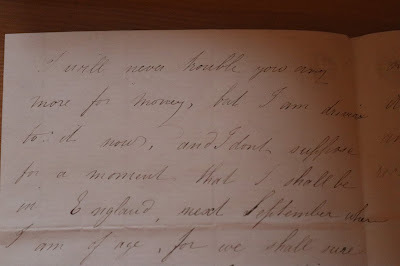
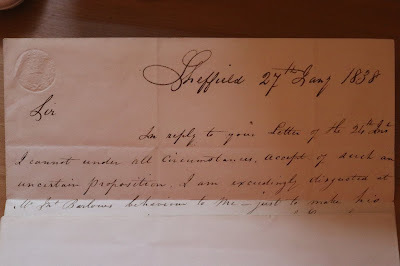
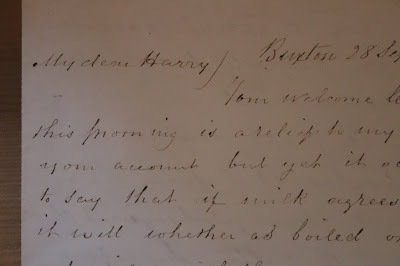
August 15, 2024
#HistFicThursdays - And now for something completely different... COMPETITIONS!
Today's blog is a heads-up on an Historical Fiction competition which is being run by Globe Soup.
If you want more details, head over to their website here.
At Crowvus, our competition season is in full swing: entries for our Ghost Story Competition have been coming in for the past couple of months and the deadline is 30 September. We’re looking forward to reading the stories which always form a key part of our autumn reading.
If you’re looking for inspiration, look no further than Those Experiences, which is available as a free eBook from our website. This should give you a good idea of the kind of stories the Crowvus team find particularly chilling and, as we make up most (but not all!) of the judging team, that’s a pretty good place to start!

This week, another competition was announced which is of particular interest to historical fiction writers: the Globe Soup Historical Fiction Challenge. It doesn’t give you much time to write your stories but, with six great historical periods, it will certainly give you a good platform from which to launch a story!
The time periods are:
1. The Black Death2. The Vietnam War
3. The Roman Empire
4. The California Gold Rush
5. The Renaissance
6. The British Colonial Period in India
And, as with other Globe Soup Challenges, you are assigned a time period blind. I knew the exact one I did not want (The Vietnam War) so opted for the mysterious Ticket 2, and got the one I wanted most!
So, there you go… two great competitions to end your summer with.
I look forward to reading your spooky stories!
August 7, 2024
#HistFicThursdays - Try Before You Trust: To All Gentlewomen and Other Maids in Love - Constance Briones - Book Excerpt

Today for #HistFicThursdays, I am delighted to be sharing a book excerpt from Constance Briones' brilliant new book! I'm once again teaming up with The Coffee Pot Book Club to share an excerpt from Try Before You Trust: To All Gentlewomen and Other Maids in Love!
First of all, let's meet the book...
What if Taylor Swift found herself penning songs about love in Elizabethan England when women were required to be chaste, obedient, and silent?
Isabella Whitney, an ambitious and daring eighteen-year-old maidservant turned poet, sets out to do just that. Having risked reputation and virtue by allowing her passions for her employer's aristocratic nephew to get the better of her, Isabella Whitney enters the fray of the pamphlet wars, a scurrilous debate on the merits of women.
She's determined to make her mark by becoming the first woman to write a poem defending women in love, highlighting the deceptive practices of the men who woo them. Her journey to publication is fraught with challenges as she navigates through the male-dominated literary world and the harsh realities of life in sixteenth-century London for a single woman.
Loosely based on the life of Elizabethan poet Isabella Whitney, this is a compelling tale of a young woman's resilience and determination to challenge the status quo and leave her mark in a world that was not ready for her.
You can buy Try Before You Trust is available via this link.
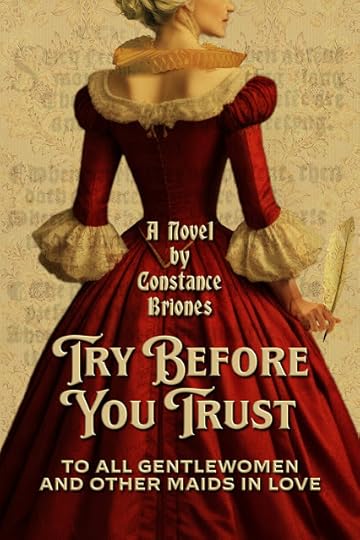
And here's an excerpt to whet your appetite:
“I have a fine collection of books suitable for your training here. Books that will reinforce the virtues of womanhood and housewifery skills. What say you? Are they of interest to you?”
My disappointment caused a surge of resentment to well inside me. Nay, they are not. I have a hunger to read books that are deemed unsuitable for our sex. Do you really believe that women need men to control what we read because of our weak nature? That we will be unduly influenced by romantic tales, leading us astray from the path of virtue? I don’t believe that –no matter how vigorously the church fathers preach it from their pulpits.
Zounds! I wish I had said that. Instead, inculcated by the teachings of my mother and father, I followed proper decorum. “And the reading of scripture is also important, my lady.”
Her smile became more inviting. “How is your hand with the needle, Isabella?”
The needle — how I hated it. Did she expect me to devote the little leisure time I would have to needlework and not read nor write poetry? I didn’t wince but smiled, “Quite competent, my lady.”
Now, let's meet the author:
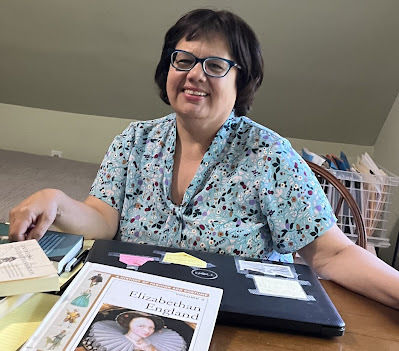 Constance Briones has a Master's in Woman's History, which informs her writing.
Constance Briones has a Master's in Woman's History, which informs her writing.She first learned about the subject of her debut historical fiction novel, the sixteenth-century English poet Isabella Whitney, while doing research for her thesis on literacy and women in Tudor England. Isabella Whitney's gusty personality to defy the conventions of her day, both in her thinking and actions, impressed Constance enough to imagine that she would make a very engaging literary heroine.
As a writer, Constance is interested in highlighting the little-known stories of women in history. She is a contributing writer to Historical Times, an online magazine. When not writing, she lends her time as an educational docent for her town's historical society.
She contently lives in Connecticut with her husband and Maine coon sibling cats, Thor and Percy.
You can find Constance on these links:
To follow the rest of the tour for Try Before You Trust, click on the banner below:

August 1, 2024
#HistFicThursdays - Ancestors - Mariner Hawkes: Charity Boy
I've just got back from a week away hunting for ancestors. Yes, this might not be everyone's idea of a fun holiday, but Judith and I adventured around many churchyards and churches, looking for any names on stones or monuments which matched those already in our family tree. As well as taking photos of graves and monumental inscriptions, we also took pictures of the fonts where our ancestors were baptised.
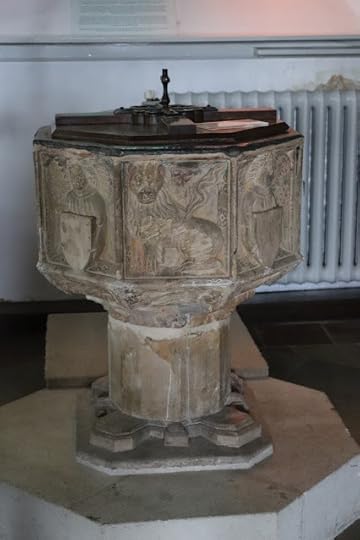 The font in Aldeburgh,
The font in Aldeburgh,where countless members of our family were baptised
But one of my favourite discoveries was when we visited a library and raided their Local History section. In one of the books we found the most random section about Thomas Hudson, a local tailor, who used to work sitting cross-legged on the floor. It's a trivial thing but, at once, I felt I knew him better. These apparently throwaway facts take a name on the page - or stone - and turn them into a real character.
Ancestors are a great place to start with character-building. My most recent writing has been Mariner Hawkes: Charity Boy, built on a number of people from the Aldeburgh branch of my own family tree. From research we've done into our family, I had a pretty good idea of what had been expected from the young men of the family, most of whom were educated at the Greenwich Hospital School (where the title "charity boy" comes from), and then either into the navies, any branch of what later became the Coastguard Service, or as a Trinity Pilot.
This isn't the only ancestor-inspired character I've inserted into my writing. Everyone comes from a family of intriguing individuals. Have a go at uncovering your own family tree and find the ancestor whose story you'd most like to bring to life. They could go on to be the star of their own adventure, or remain as a peripheral character whose full significance only you will know.
July 25, 2024
#HistFicThursdays - Beneath Black Clouds and White - Book Excerpt
I've been talking a lot about my family saga this month, so here's a little excerpt from Beneath Black Clouds and White. Although I published this second, it comes first chronologically.
I hope you enjoy it!

Chapter Nine
Persephone and Rosanna
Fotherby wasted little time as Peters left him, but began walking in the direction of Mayfair. After arriving at the house of Sir Manfred Chester so late on the last two occasions he had been a house guest, he was determined to arrive at a civilised time. He reached the white fronted house in the late afternoon and paused at the steps, uncertain that he should presume to simply arrive there. He walked across the road, rebuking himself for his lack of etiquette. He still carried the card that Peters had given him and he wondered at what the address was. It was somewhere in Westminster, and he was on the point of returning into the city when he turned at the sound of his name.
“Henry! You have come back to us. You must come in at once.”
“Miss Chester,” Fotherby began, once more feeling awkward about the young woman’s familiarity. He pulled his hat from his head and bowed slightly. “I was unsure that I should simply appear on your doorstep.”
She took his hand and guided him back across the road. “But of course you should, Henry. You have only just missed your uncle by three days. When did you arrive in London?”
“Only today, Miss Chester. Scarcely four hours ago.”
“Papa will be so pleased to see you,” she continued as she shut the door behind them. She pointed across at one of the black servants and turned to Fotherby. “Was that bag all you brought with you, Henry? Did you have no other belongings with you in Europe?”
“The army provides all the shelter I need. I do not need to carry blankets or pots like the rank and file.”
The servant took the bag from Fotherby’s outstretched hand and paused in surprise as the young surgeon thanked him, before he carried it through the door at the back of the entrance hall. Persephone laughed as she guided Henry through to the Drawing Room.
“Father has gone into Town, so there will be only you and I for supper. You must be starved. I heard reports that our army were not prepared for such an extended stay on the continent.”
“It is true that I am hungry, Miss Chester.”
“Then we shall eat at once.” She walked over to pull the bell cord and a servant stepped into the room within seconds. “We shall eat now, Manny,” she continued, addressing the young man who had just entered. Without pausing to allow Fotherby any argument, she walked through to the Dining Room, guiding him by the wrist.
“I am not ready to eat,” Fotherby protested.
“Father is not here to object to your presentation, Henry, and certainly I do not care.”
Fotherby took the seat that was pulled back for him after waiting for Persephone to be seated. She looked critically across at her servant as she regarded the drink in her crystal glass.
“I shall have you flogged,” she began, pushing the glass from her. “What is this?”
“Elderflower cordial, my lady,” Manny replied.
“Where is the wine?” she demanded.
“Pardon, my lady,” came the timid response while Manny glanced sideward at Fotherby. “I believed you would wish to drink what your guest was drinking.”
“But why have you not served him wine?”
“For I remember the gentleman from his last visit. He does not drink wine.”
“Henry,” Persephone began, her cheeks reddening as Fotherby knew his own were, “is this true?”
“It is true,” he replied. “Thank you for remembering, Manny.”
“It is my duty, sir.”
Persephone, clearly disconcerted by this conversation, dismissed her servant. “Why do you not drink wine?”
“I like to maintain a clear head at all times, and I do not believe I can gain anything by drinking it. But I do not want to stop you.”
“While you do not? I would not do that, Henry.”
“I am quite used to my fellow officers continuing to drink while I do not.”
“Uncle Paul does not abstain,” she whispered.
“No, but my father does. And while I respect my uncle, I admire my father for his adherence to his moral code.”
Persephone smiled across at him. She reached to one side and picked up a feather fan behind which she hid her face. The food was brought out after several minutes, and with its arrival the silence in the room was broken.
“Uncle Paul was well,” Persephone’s elegant voice chimed.
“That is good to hear,” Fotherby replied, relieved to be leaving behind the earlier topic of conversation. “What does my uncle do when he stays here?”
“For the most part he and Father remember days spent overseas. Sometimes they visit Father’s club, but both of them love playing cards, so Father’s friends often come here. In truth, I find it rather dull when they play cards for I am so often left by myself. But Uncle Paul will also spend several evenings just sitting and talking with Father and me. And then, he talks about you.”
“I do not wish to know what he says of me,” Fotherby laughed. “I think at times I distress him with my attitude.”
“Not at all, Henry. You, he holds in the most elevated place in his esteem. He loves you like a son, not a nephew.”
They continued to talk while they ate, but Fotherby was pleased to be able to have a chance to wash and make himself presentable before Sir Manfred Chester returned to the house. His host was surprisingly pleased to have him under his roof once more and Fotherby was confused by the embrace that the older man offered him.
“Have you any other children, Sir Manfred?” Fotherby asked as they sat around the hearth that night.
“No. Persephone has been my only child. She will inherit everything.”
Fotherby felt his eyes widen at this remark, unsure that wealth was something he should so openly discuss. He could find no words to offer in reply to this and so sought for a way to change the subject, feeling the weight of Persephone’s gaze on him.
“I was told to attend an address in Westminster. Do you know this place, sir?” He presented the card to Sir Manfred and watched as the older man frowned.
“Who told you to go here?”
“My captain suggested that I should visit. What is this place?”
“It is a clubhouse,” Sir Manfred replied. “If I might be as honest with you as I am with your uncle, it is not a place I would expect you to visit.”
Fotherby took the card back and looked down at it, wondering what Peters had suggested to him. He felt that he had disappointed his host and, although Sir Manfred did not mention it again, he could not escape the feeling of guilt.
This remained with him as he retired for the night. He placed the card on the desk and sat looking at it as though it were alive and an animal he did not trust. He turned as there was a knock at the door and he stepped over to open it. Manny looked across at him and gave a brief smile as he lifted a jug.
“I have brought you some water, sir.”
“Thank you, Manny.” Fotherby stood back to allow him in. Manny walked in and set the jug down on the washstand before he bowed his head and turned to leave. “Do you know that address, Manny?”
“Sir?” the servant began. Fotherby handed him the card and Manny shook his head. “I cannot read, sir. Are you truly Mr Fotherby’s nephew, sir?”
“Truly. Is it so difficult to believe?”
“You are not like him, sir. That is all.” Manny smiled across as Fotherby felt his brow furrow. “Is there anything more I can get for you, sir?”
“No. Thank you, Manny.”
Fotherby watched as the young servant left the room and he considered this brief conversation into the night while he penned a letter to his father. He rocked the blotter over the paper and read back its contents.
“My dear father, yesterday I returned safely to England and, while I must remain in London for a short time to conclude business and settle some affairs, Captain Peters has been gracious enough to allow me time to return home. Our campaign on the continent concluded unsuccessfully, though I feel that I have acquitted myself adequately. I am staying at the house of Uncle Paul’s friend, Sir Manfred Chester. While I am hugely grateful for the welcome and generosity that has been shown to me, I find I am greatly confused by the running of this house and look forward to returning once more to the simple comforts of Wanderford Hall. I hope to return before the end of May. Your loving son, Henry.”
The following morning Fotherby rose early, washed in cold water and sought for something that would make him look more presentable than the state in which he had arrived the previous afternoon. He was more than a little surprised to find that a suit of clothes was laid ready on the chair and a frock coat hung from the wardrobe door. They were his own, he realised, washed and pressed since his arrival and carrying a pleasing smell of lavender. After dressing and securing his hair, which had been left rather unkempt in the past year, he walked down the stairs and was met by Manny.
“I am afraid I overslept,” Fotherby began, but Manny only smiled and shook his head.
“No, sir. You are the first of the gentle folk to rise.” He straightened Fotherby’s collar and brushed down the coat before he continued. “Is there anything I can get for you, sir?”
“Directions, Manny. I am returning to Westminster, but what is the best way to get there?”
“I shall have the carriage readied. Will you take breakfast first?”
“I will take coffee if it is offered,” Fotherby replied, smiling across. “But I do not want the carriage. My feet will carry me far more safely. My uncle trusts horses, but I am afraid I find them a little too unpredictable.”
Manny returned the smile before he went to fulfil Fotherby’s wish, returning with a silver tray bearing a silver coffee pot with a china cup and saucer.
“You must go left out the house, sir. Then there is a broad road to the right that will carry you to the river. From there you cannot miss the palace of Westminster.”
“Thank you, Manny. Have you been to Westminster?”
“On a few occasions, sir,” came the reply, uncertainty in his low voice as he tried to unravel the meaning in the man’s words. “But I have little time of my own and only visit when Sir Manfred has cause for me to do so.”
Manny walked out and Fotherby drank the coffee in silence, rising to his feet to survey the paintings and trophies which lined the room. There was a strange, sad mystery that grew in him with each image he beheld. He wondered over the lives that were portrayed here, captured in the oil and canvas which illuminated the scorching sun and the endless blue sea.
“I miss that view the most.”
Fotherby turned to face Persephone, who stood in the doorway.
“It looks like a beautiful place, if perhaps not such a beautiful situation.”
“Oh, but it was, Henry. Before we were chased from it. Saint Domingue and Saint Vincent are magical islands. I wish more than anything that I could return there. Almost anything,” she corrected, hiding her face behind the large feather fan. “Will you walk with me through the park today?”
“Miss Chester,” he began, “I should love to escort you, but I have a duty first to fulfil. Might we not postpone such a walk until tomorrow?”
“Of course, Henry. But I shall not forget.”
“Nor I, Miss Chester. I assure you.”
Fotherby set the coffee cup once more upon the tray and excused himself. He followed Manny’s directions and found that he reached Westminster palace before noon and now he looked down at the address on the card and considered how best to find it. He walked through the streets, taking circles and becoming so lost that he had to continue returning to the palace before he would begin walking in a different direction. He continued this measured routine until the bells sounded two o’clock when, at last, he located the street he had been encouraged to find. The clubhouse was halfway along the road, guarded by two men who both wore short white wigs and long navy blue jackets. They stood at the top of four steps, by a wide open door. A second door remained closed. Three carriages were lined up along the road, each with a driver wearing a different uniform, so none were cabs.
Fotherby looked at the card in his hand and matched the name to that on the brass plaque beside the entrance, unsure what this place was and why Peters would direct him here when it had offended his host. Fotherby was so clearly outclassed. He stood, for countless minutes, while the two footmen continued to watch him. Eventually two men walked out of the club. They were both strangers to him. They shared brief words with the doormen before they looked across at Fotherby and frowned slightly. Then they boarded one of the carriages and the driver moved on.
Unsure how to take such a slight, Fotherby walked away from the club, turning the card in his hands and counting the number of rails that he passed. He did everything he could think of to avoid solving the riddle of why he had been sent to this place. From the corner of his eye he could see more men leaving and the two remaining carriages were moved forward. He kept his face lowered, reluctant to exchange a glance with the drivers or the men who had stepped into the coaches, but he looked up as the first carriage was halted a little in front of him.
“I cannot believe it,” a voice announced as the inhabitant of the carriage leapt down without waiting for the assistance of the driver or the footman. “Lieutenant Fotherby? Whatever are you doing here?”
In his mind, Fotherby had tried to understand what this place was that his captain had pointed him to. He had considered whether it was a military venue, or perhaps it was linked with his ambition in surgery. The one possibility he could never have guessed was the one that presented him with the face before him.
“Lord Barrington,” Fotherby whispered, smiling in a confused manner, “I do not understand.”
“You do not understand, Fotherby?” Portland laughed. “I do not understand. Surely it cannot be coincidence that has found you outside my club.”
“No it is not. But it is far more confusing, sir, for it was Captain Peters who directed me here. Though he gave me no indication as to why.”
“That is confusing. But now that you are here, Fotherby, you must come and meet my wife.” He guided Fotherby to the carriage and waited until the surgeon had taken a seat before he stepped into it. The carriage moved forward once more. “When Brotherton, the club doorman, told us of a suspicious character, I must admit you were the last person who came to my mind.”
“I must have seemed suspicious when I consider it. And, indeed, the two gentlemen who left before you did not seem happy with my being there.”
“The taller of the two, he is not a man to make an enemy of,” Portland laughed. “That was our Prime Minister.”
Fotherby felt his brow furrow at this revelation but remained silent for a time before he asked, “What do you do in your club?”
“Regrettably, we talk.” A swift change came over his friend as he looked out of the window. “We talk. For there is little more we can do. It is frustrating beyond measure.”
“You are involved in the work of the Prime Minister?”
“It is not his work. It is his hopes.” Portland turned to his friend and offered half a smile. “I will let my wife explain it, Fotherby, for she is far more eloquent than I. I become angry about it, she does not. But come, tell me, when did you return to England?”
“Two days ago. Peters seems sure that we will be called out once more, but he has told me I should return to Derbyshire.”
“He will see you succeed, Fotherby. He wants to create the best future for you.”
“I feel I have to ask you,” Fotherby muttered and Portland smiled slightly as Fotherby frowned, “Peters told me that he could not find me a better friend than you. Why, then, does he dislike what you discuss with your friends?”
“He said that?” Portland muttered.
“He said that, since I worked for the king, I should not associate myself with your cause. But that there was no friend truer than you.”
“When you meet Rosanna, she will answer your questions.”
“Did you return to Cornwall?”
“Yes, I returned but we have a great cause here in the city that requires my presence.” Portland smiled across at Fotherby as the carriage stopped. “Come and meet my wife.”
Fotherby watched as Portland stepped out of the carriage before he followed him and looked at the house before him. They were on a quiet street, standing before a small house with a large semicircular porch, and it was to this that Portland guided him. The door was opened by a man who wore a long red coat and stepped back to allow the two men admittance.
“Thank you, Chilvers,” Portland began, pulling the wig from his head and tapping the servant’s shoulder. Chilvers was an old man with white, wispy hair and a thin face, who smiled across at his master. “Where is Rosie? I have someone I would like her to meet.”
“Lady Barrington is in the Parlour, I believe, sir. But she is in a lesson.”
“Then before I interrupt her I shall introduce you to my esteemed friend.” Portland indicated to Fotherby who stepped forward tentatively. “Chilvers, this is Lieutenant Henry Fotherby, a great friend who helped me survive the last two years. Fotherby, this is Chilvers, the poor soul who is left to correct all my mistakes.”
“An honour to meet you, Lieutenant,” Chilvers began, as Fotherby bowed his head slightly.
“Fotherby,” Portland laughed, “you must come and sit for a time, you look exhausted. Chilvers, arrange a drink for Fotherby, please. I shall be unpopular, I know, but I must go and fetch my wife.” Portland guided Fotherby, who followed silently, into a large study and at once the sound of music filled the air. Someone was playing a lively tune on a pianoforte in the room beyond and Fotherby felt a smile cross his face. It stopped abruptly as a discordant note sounded, jarring the performance.
“It is hopeless,” he heard a woman’s voice announce as Portland opened the door.
Chilvers invited Fotherby to take a seat in a leather armchair by the empty fireplace.
“What can I get you to drink, Lieutenant?”
“Whatever is convenient, Mr Chilvers, please.”
Chilvers disappeared, leaving Fotherby alone in the room. It was unlike any room he had ever seen before. There was a large tapestry over the fireplace that portrayed two unicorns bowing before a tree, and around the edge were winged cherubs and creatures that had surely come from imagination. It was not the only image to line the walls - there were many paintings of men and women who Fotherby assumed were ancestors of Lord Barrington - but it was by far the most striking. The desk was immaculately ordered. There were no books left on it as in his father’s study, and all the papers were neatly arranged into three piles, unlike his uncle’s desk which was cluttered and full. A bronze inkwell with two pens rested at the back, close to where he sat.
Fotherby could hear a conversation taking place in the Parlour and he suddenly felt conspicuous. He rose to his feet and walked to the window that overlooked the quiet road where gentlemen and ladies promenaded, each with the smiles and expressions of people who had no cares in the world. There were the same type of houses on the other side of the street and Fotherby found himself contemplating the people who lived there, wondering at the lives they led and the comfort they lived in. Such thoughts led him back to considering the army and the war they had failed to win. He wondered, too, why his captain was so certain they would be returning to war, and considered what Peters had sought to protect him from in his friendship with Portland. Eager to escape such thoughts he began counting the rods in the railing before the house, and was still doing this when Portland re-entered the room.
“My dear Fotherby,” he laughed. “Has Chilvers not found you a drink yet?”
Fotherby turned and smiled across at him but shook his head.
“Poor Chilvers,” Portland muttered. “He has worked here for almost five decades. He forgets so many things, but I cannot find it in my heart to dismiss him. Ah,” Portland added as he turned back to the Parlour and then to Fotherby once more. “Fotherby, allow me to introduce my wife, Lady Barrington. Rosanna, this is Lieutenant Henry Fotherby.”
To his immediate shame, Fotherby had decided in his head what Portland’s wife should look like. He had imagined her to be beautiful beyond any other living soul and to be perhaps his own age and of a delicate build. In truth, all these things were accurate, except that she was perhaps a little younger. An enormous smile filled her face as she entered.
“You must forgive me, Lieutenant Fotherby. I have struggled with Mr Mozart’s sonata for so long, I was adamant that I should conquer it today.”
“I have arrived unannounced and unexpected, Lady Barrington. It is I who should ask forgiveness of you.” He took in her looks now as he bowed his head, for she was in no way the wife he had expected his friend to have, yet at once Peters’ objections became clear. She had jet black hair that was fastened up in a thick red ribbon. Her eyes were exactly as Portland had described them, for they were like two stars in the midnight of her black face. She wore a pair of beautiful pearl earrings that only made her perfect smile more radiant. All the while that he took this in, she watched his gaze, trying to gauge what he was thinking.
“I am not what you expected, Lieutenant Fotherby. I can see that in your face.”
“Perhaps not,” Portland whispered in a tone that could have given the two words a hundred meanings.
“I confess,” Fotherby began as he stepped forward, taking her hand and bowing so low to kiss it. “My prejudices did not anticipate such a revelation. But all the same I am as spellbound as your husband by the image before me.”
Lady Barrington laughed as she looked across at her husband. “Lieutenant Fotherby, you are all the things Philip said you were. I am very pleased to have you as a guest.”
“Thank you, Lady Barrington. But tell me, do you prefer Mr Mozart’s work to that of Mr Haydn? For I find Haydn far more to my liking.”
“But I love Haydn!” she replied happily. “Indeed, last year I attended a concert he gave here in London. Only I find Mozart’s music so much harder to play that I am determined to conquer it.”
Portland watched as the two of them talked happily together. He felt unsure whenever he introduced his wife to anyone, but never ashamed, for he worried always how she would be received. But his friend had proved himself a true gentleman, as Portland had been so sure he would.
“I must excuse myself, gentlemen,” Lady Barrington announced after a time. “For I was told that Chilvers would be bringing a drink and I believe I must discover what has happened to him.”
She walked out of the room, her beautiful dress hiding her feet so that she appeared to glide. Portland watched her go with a smile before he turned back to Fotherby, who was studying him thoughtfully. Trying to ignore this, Portland indicated to one of the chairs and waited until Fotherby sat before he took another.
“I am not a medical dilemma, Fotherby,” he laughed. “You need not stare at me so! Tell me, what do you think of my beautiful wife?”
“I think she is everything you said she was. But I cannot help but wonder why you did not tell me all she was. Why, when this is what Peters most certainly meant, did you not tell me?”
“I do not want you to lose your sponsor in Captain Peters, Fotherby. But when he sent you to the club I realised that you would not lose him. I did not want you to become embroiled in our political battle when you did not fully appreciate what was being fought for.”
“Where did you meet Lady Barrington?” Fotherby asked softly, wishing to turn the conversation from his captain.
“My grandfather had land in Saint-Domingue, for he married the daughter of a French colonist. He travelled out there over twenty years ago, to oversee the work that was being done, and found Rosanna’s mother. She was trying to rid herself of the child she carried, for she could not bear the thought that her daughter would be raised in the most vile form of slavery. You are a medical man, Fotherby, you can imagine the scene perhaps better than I.” Portland lowered his gaze from his friend, whose face was set firm. “My grandfather returned to England with her, but she died on the boat journey here. But not before Rosanna was born. Grandfather brought her into our house as a sister to Cassandra and me. He was not well met in this. My uncle would not tolerate it, having a black child in the house. So my grandfather passed the inheritance on to my father, who was a younger brother. Father dropped the name Bryn-Portland in favour of simply Portland, for our Welsh family were still slave owners. And that, dear Fotherby, is what Captain Peters objected to.”
Portland lifted his eyes once more to his friend as he concluded his telling of the bitter tale. Fotherby returned his gaze with a look that spoke of utter turmoil and, indeed, that was what he was feeling. It seemed wrong to him that any human should seek to enslave another, that a mother could be so desperate to spare her child this hopeless life she should seek to kill it, and so despicable that anyone could condone it. Yet Captain Peters was not a bad man. He had supported Fotherby to such a great extent, funding his exam, allowing him the time to return home, and restoring to health any men who he could help, irrespective of rank or status.
“That is what we discuss at our club, Fotherby. The injustice of it all. And imagine,” Portland continued, a rueful smile on his face. “Imagine, Fotherby, loving a woman so much, and she loving you in return, but her not marrying you for fear of bringing you disgrace. Four times I had to beg Rosie to marry me, for she did not wish to bring shame to me. Shame simply because she was born black and I white. That is not what God wanted of us, Fotherby, I know it.”
“What changed her mind on the fourth occasion?”
“My father,” Portland laughed. “He told Rosie that any son who failed to secure his heart’s affairs could never secure the affairs of the Manor. He said he would disinherit me. To this day I am not sure if he meant it, or simply wanted to bring us together.”
“You come from a very interesting family, Lord Barrington.” Fotherby smiled across at him. “But I do believe you have a war worth fighting.”
“The more I learn of you, Fotherby, the better I like you. That is a rare thing to find in a man. But if we are to be friends, please do not address me as Lord Barrington. Call me Portland.”
“And what should I call Lady Barrington?”
“Rosanna,” she announced as she walked into the room. “That is the name my mother gave me. I have no doubt that Philip has already told you about her.”
“That is true,” Fotherby said softly. “But I cannot bring myself to address you with such vulgar familiarity. You are far higher in society than I.”
“You are a dear man, Lieutenant,” she whispered. “Call me Mrs Portland if you must, but I would rather you called me Rosanna.”
Lady Barrington had returned with Chilvers, who was carrying a tray with a teapot and three small bowls. The old man began filling the bowls from the teapot and Fotherby felt his brow furrow in confusion, but all the same he took the bowl that was offered and thanked him. Portland smiled across at his friend who looked doubtfully at the bowl while Lady Barrington tutted disapprovingly at her husband.
“In China,” she began to explain, “tea is sometimes drunk from bowls like this.”
“Have you been to China?” Fotherby asked.
“No,” she replied softly. “But Grandfather travelled everywhere.”
Fotherby lifted the bowl to his lips and sipped the tea. For the rest of the day Fotherby remained in the home of his good friend and did not depart until the sun was casting long shadows outside. Now, he rose to his feet and graciously thanked his hosts before promising to return and visit them once more. He would have happily walked back into Mayfair, but Portland was insistent that Fotherby should take the carriage and so it was readied for the journey while Fotherby bade goodnight to them both.
“You must come and see us soon, Lieutenant Fotherby,” Lady Barrington announced. “I owe you so much for protecting Philip when you were both in Flanders.”
“I did nothing to protect him, Mrs Portland. Indeed, he assisted me. But you may rely upon my returning, for I have thoroughly enjoyed today and the company of you both.”
“You are a rare gentleman, Lieutenant Henry Fotherby,” she replied, leaning against her husband who wrapped his arm about her shoulders.
Fotherby thanked Chilvers for handing him his hat, before he stepped out into the sunset. The carriage journey lasted longer than he expected and, by the time he arrived outside Sir Manfred’s house, the sunlight had vanished from the sky and night was upon him. He stepped quickly up to the front door and it was opened at once by one of the black servants.
“You are a busy gentleman, Lieutenant Fotherby,” Sir Manfred remarked that evening as he sat drinking a glass of claret. “You vanish so early in the morning and we do not see you again until the sun has set.”
“Forgive me,” Fotherby replied. “I had to see a dear friend. I assured him I would seek him out when I returned to England.”
“But you are taking me walking tomorrow, are you not, Henry?” Persephone’s voice rang.
“Indeed, Miss Chester. I could not forget that, though you may have to lead me to a suitable place, for I know London as little as Paris.”
“Of course I shall, Henry,” she laughed, while her father pursed his lips to keep from doing the same.
Fotherby’s misgivings concerning his hosts deepened as he lay in bed the following morning, trying to find the courage to rise and journey out. Miss Persephone Chester was certainly beautiful. She was rich and capable of holding a conversation on almost any topic. But Fotherby could not reconcile himself with the constant questioning he had about her social beliefs. It was strange that Peters had warned him about Portland on account of him marrying a black woman when Fotherby felt far less comfortable in a house full of black servants.
He looked across at the door as there was a light knock upon it. For a time he was content to ignore it and pretend that he had not heard, but it sounded again only louder than the first.
“Yes?” he called out gingerly, and the door was opened quietly by Manny.
“Miss Chester is downstairs. Waiting, sir.”
“Of course,” Fotherby whispered, hoping that she had forgotten.
Manny smiled slightly, perhaps more than he was permitted to, at this response, but remained silent as he helped Fotherby dress. Finally, as he brushed down the frock coat that the young surgeon wore, Fotherby broke the silence.
“Were you born here, Manny?”
“Here in Mayfair?” he asked back before he shook his head and continued. “No, sir, I was born on the ocean.”
“On your way to England?”
“No, sir,” the black man replied once more, his voice becoming uncomfortable. “Between Africa and the Americas.”
“I met a black lady yesterday,” Fotherby mused, uncertain that he should push this topic with the young man, who was clearly becoming unsettled. But he felt he had to know the answers to his questions and neither the Chesters nor the Portlands could provide them. “She, too, was born on a boat journey, but the journey to England.”
“A lady?” Manny asked, his voice calming. “You mean a servant, surely?”
“No. She is the wife of my dear friend, Lord Barrington. And she is a Lady by all standards of the word.”
“Then her owner was better to her than mine shall ever be.”
“You are not slaves here.”
“In all but name, Lieutenant Fotherby. Your friend sounds like a good man to marry a black wife.”
“Good?” Fotherby choked on the word before he shook his head. “In love. But he is certainly not a man to compromise for social constraints. Lady Barrington was raised as a sister to him, and they fell in love.”
“You are a strange man, Lieutenant Fotherby. I have never met a man like you, nor your friend. To most I am a possession, a tool to assist.”
“But, Manny, you are a human being. As Lady Barrington is and as I am.”
“Do you seek to ensnare me?” Manny asked angrily. But it was fear that drove his anger, not maliciousness. “Since you are so interested I can detail for you my worth in ten seconds, Lieutenant Fotherby. I was born in the cramped squalor of a slave ship hull. When Sir Manfred could not sell me for what he deemed was my worth, I returned with him as his own servant to England. My apologies, sir. I believe I have taken too much of your time.”
Fotherby’s gaze never altered, although he could feel the dizziness that accompanied the determination to withhold tears. Manny walked out of the room without looking back at Fotherby, who lowered his head, feeling overwhelming guilt at pressing the young servant on the topic. After several minutes he walked from the room and forced a smile as he saw Persephone waiting at the foot of the stairs between the two huge marble statues.
“I had almost despaired of you, Henry,” she began, her musical voice making each word beautiful.
“I had not forgotten, Miss Chester. How could I?”
“My dear Henry, your manners are so impeccable that I knew you would not.”
Having taken so long to appear downstairs, Fotherby did not wish to take longer by breakfasting but offered her his arm and smiled down as she accepted it. They walked out of the house and into the radiance of the spring morning. Silence accompanied them for a time before Persephone spoke.
“Uncle Paul talks continuously. Yet you are as quiet a man as I have ever met.”
“Perhaps it is because my uncle talks so much that I remain so quiet,” Fotherby replied with a smile. “My uncle and my father are as different as brothers can be, and I am far more like my father.”
“Did you inherit nothing from your mother?”
“I do not know. I never knew her. But my father has told me on occasions that I am like her in some ways.”
“I imagine it is your eyes, Henry,” she continued, turning to study him as they walked towards a wrought iron fence. She waited until he opened a gate and she stepped through. “Your eyes are nothing like Uncle Paul’s eyes.”
“I believe my uncle’s looks changed greatly while he was in the West Indies.”
“Where have you travelled to, Henry?”
“India,” Fotherby whispered in reply. “Flanders. That is all.”
“Is India as beautiful as the West Indies?”
“I have never been to the West Indies. But I loved India. It was open and rich. I would return once more if I could.”
“But then why do you not go? You are a gentleman of money and property. You should easily afford to go.”
“No. I have a duty, and a duty I love, to help and serve the men of my regiment.”
“I confess,” she replied, shaking her head as she considered his words. “I do not understand why you chose to work when you will be rich beyond measure upon your inheritance.”
“Miss Chester,” Fotherby began, “far be it from me to contradict a lady, but I feel I must correct you. Whatever my uncle has told you, Wanderford Hall is a small country estate and I shall never be as rich as you seem to believe.”
“Perhaps your house is small, Henry, but Uncle Paul owns seven mills in the north and still has lands in Saint Vincent. You shall be very well provided for.” She stared up at him and lifted her gloved hand to her mouth. “You did not know you were to inherit your uncle’s wealth?”
“No, I had not thought of it. Nor did I know that he has lands in the West Indies.”
“One day you must journey there, for it will rival India in your affections. It is so beautiful.”
“I think I have heard enough of Saint Vincent and Saint Domingue without ever wishing to visit. I could not bear to witness the scenes that have been described to me.”
“You have spoken to Manny, then,” she said with a disapproving tone. “I have warned Father about the impact of keeping such a hot-tempered man. He has no place talking to you.”
“It was not him,” Fotherby began, trying to defend the man from whom he had demanded an answer. “I met a lady yesterday, Lady Barrington, and her mother was a slave in Saint Domingue.”
“A black lady?” Persephone’s tone made her words sound as though the very idea disgusted her. “And she is the wife of your friend?”
“Indeed.” Fotherby forced himself to remember that etiquette dictated he should continue to hold this lady’s arm whilst every principle in him wished to distance himself from her with each comment she made.
“I hope you have not hopes of winning such a lady, Henry. It is quite wrong and contradicts the very nature of our society.”
“So my captain tells me. But Lady Barrington is not the lady who holds my affection.” He felt his cheeks redden as he spoke and Persephone smiled gently across at him.
“You need not blush, Henry,” she whispered, her tone soft. “Gentlemen may fall in love, you know. And those who fall deepest should speak more of it.”
“You are very gracious, Miss Chester, but I feel that every word I utter or every move I make, I somehow offend society more and more.”
Both of them fell silent for a time. They were not alone in this park, and each couple they encountered would politely greet the other until both of them felt a little foolish with such strutting and Fotherby escorted Persephone to one of the benches. When she was seated he rested beside her and the two talked happily. They discussed trivial issues such as the weather and Fotherby explained about many of the plants which were growing in the gardens there.
Despite his misgivings about Miss Persephone Chester, Fotherby was forced to admit to himself that he began to enjoy her company. And as the day wore on and they returned once more to the house, Fotherby was sorry their conversation was over.
“I have enjoyed this morning, Henry,” Persephone began as she stepped into the house.
“As have I, Miss Chester. Thank you.”
“Someone left this for you, sir,” Manny began as he stepped over to the two of them and offered a silver platter to Fotherby.
“Thank you,” Fotherby whispered as he picked up the letter that rested on it.
“Don’t thank him, Henry,” Persephone laughed. “He is doing his job, only.”
Any affection that Fotherby had felt during their outing faded away as he watched Manny bow before walking away. Persephone called after him, ordering that dinner should be readied soon, before she walked through to the Drawing Room. He looked at the letter in his hand and stared at the writing, for he did not recognise it and he wondered who could have known to find him here. Still standing in the entrance hall, he opened the letter and read through it.
“Lieutenant Fotherby, I understand that you have returned once more from your duties overseas. I should like to invite you to Horse Guards tomorrow at midday, for there are matters I wish to discuss with you. I shall expect you. Regards, Major Josiah Tenterchilt.”
This brief epistle, from a man he scarcely knew, and in such a formal tone, gave Fotherby a great cause for concern. As the day continued he forgot his confusion about, and distaste of, the question of slavery and the freedom of men, and considered only the baffling nature of the note he had received.
The remainder of the day passed by in this manner and he retired early to bed. However he spent several minutes pacing the floor of the room, and read the letter so many times that the four lines were etched in his memory. He felt that, with the clipped manner of address, the major was accusing him, and Fotherby considered all that had happened with regard to Major Tenterchilt. As he stood in the centre of his room, having shed his coat and shirt, he wondered at how the gentleman, as crippled as Mr Tenterchilt had been, could not only have returned to the army, but furthermore have been given a promotion.
Fotherby marched to the door as a knock sounded and he stood back to allow Manny into the room. The black man kept his face lowered as he shuffled in and waited until Fotherby closed the door before he offered an explanation.
“I wished to apologise to you, sir.”
“Whatever for?” Fotherby began. “It is I who should apologise to you for pressing you on such a distressing topic.”
“I believed that Miss Chester wished you to catch me out in my behaviour. But I see that you have not told her of our conversation earlier. I misjudged you, sir. And I am sorry for it.”
“All is forgiven, Manny. Though, did you see the man who delivered this letter?” Fotherby lifted the paper that he still carried.
“No, sir. I am your servant in this house. Another deals with the door while you are here.”
“It is a tightly run ship, this house, is it not?”
“It is a cruelly run house, sir. And I find myself wishing to know your friend to learn what help he can give to us.”
“My friend?”
“The man who married where his heart lay, irrespective of colour.”
“Ah,” Fotherby said, a proud smile crossing his face. “He is a great man.”
Manny, having made his apology, excused himself from the room and Fotherby got ready for bed. Sleep was a long time coming, but when it did arrive he slept deeply, without dreams.
It was still dark outside when he was awoken. He could not be sure what the time was, nor for how long he had slept, but something had pulled him from his slumber. There was a knock on the door to his room, impatient and loud, and he realised that it was the first knock that had awoken him. Rising to his feet and rubbing his eyes sleepily, he stepped over to the door, pulling it open. Almost instantly he pushed the door closed once more, so that it was only slightly open, as he recognised Persephone.
“What can I help you with, Miss Chester?” he whispered, his cheeks blooming as he peered around the door.
“I came to see you, dear Henry,” her voice rang, not caring who in the house she would awaken with the beautiful sound. “And you need not be so bashful. In Saint Vincent the slaves often work without shirtsleeves and some work naked.”
“How can I help you, Miss Chester?”
“What must I do for you to call me Persephone?” She fanned herself with the great feathers of her fan, looking critically at the form of the young surgeon who sought for any way possible to persuade her to leave. Placing her free hand on the door, she pushed against it. “When we are married you must call me Persephone.”
“Married?” Fotherby repeated.
“But of course. Both Father and Uncle Paul have spoken on little else for the past three years. We are to be married, Henry.”
“But I don’t know you and you know nothing of me.”
“You mean you knew nothing of this?” Persephone demanded. “All this time I believed you were being well-mannered but in fact it was only that you were ignorant.”
Fotherby was unsure that he should feel as relieved as he did by such a statement and, for a moment, he wanted to contradict her. But as she turned on her heel and walked away, fluttering her fan in angry rejection, he gratefully closed the door and pressed himself against it.
He rose early the next morning and began packing his few belongings into the bag he had carried from the continent. By the time he had made his way downstairs both Sir Manfred and Persephone were sitting at the table. Persephone glared at him as he entered and, trying to ignore this reception, he turned to Sir Manfred.
“Thank you for your kind hospitality, sir, but I intend to return to Derbyshire once I have responded to the invitation I received yesterday.”
“Of course you are free to leave as you wish, Lieutenant Fotherby.” Sir Manfred glanced at his daughter who fanned herself furiously as she watched the young surgeon. “And you shall leave with our blessing, will he not, Persephone?”
Persephone made no answer but rose to her feet and left the room. The two men ate in silence and Fotherby rose as soon as he had finished.
“Do not think badly of my daughter, Lieutenant. She has become accustomed to being unchallenged, but she must learn to take criticism before she can be married.”
“But not to me, sir. I have a respect for many aspects of your daughter, but that is where my affection ends.”
“Thank you for your candour, Lieutenant.”
Fotherby was unsure whether the older man was truly thankful, but he smiled across and left the room before he collected his bag and rushed down the white marble stairs once more. Manny stood at the bottom and smiled across.
“We shall miss you here, Lieutenant Fotherby. Perhaps when your uncle visits us, you might join him?”
“In truth, Manny,” Fotherby sighed. “I do not expect to be made welcome here again, and I know there are some words of a less amicable nature that I must share with my uncle.”
“We shall welcome you, sir. For what it is worth, we below stairs shall welcome you.”
“It is worth a great deal, Manny.”
“We have something for you, sir. A gift to thank you for your kind treatment.” Manny pulled a small cotton pouch from his pocket and offered it to Fotherby. “It is quinine, sir, that I believe you call Jesuits’ Bark.”
Fotherby blinked in surprise at the young man, for quinine was sold at such a high price that these servants might just as well have handed him a crown. “Thank you, Manny. Thank you so much.” Manny smiled as he opened the door and Fotherby stepped out into London.
Crowvus Book Blog
- Virginia Crow's profile
- 128 followers



